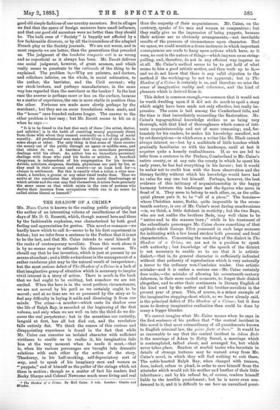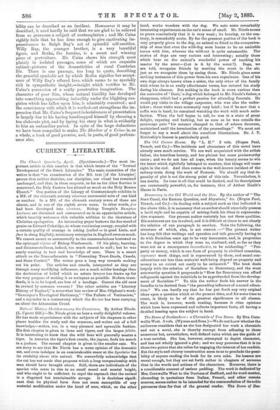THE SHADOW OF A CRIME.*
NE. HALL CAINE is known to the reading public principally as the author of an interesting volume of recollections of the last 'days of Mr. D. G. Rossetti, which, though marred here and there by the fashionable euphuism, was characterised by both good -feeling and appreciation for genius. This novel or romance—we hardly know which to call it—seems to be his first experiment in fiction; but we infer from a sentence in the Preface that it is not to be the last, and that Mr. Caine intends to enrol himself in the ranks of contemporary novelists. From this work alone it is by no means easy to estimate his chances of success. We -should say that he has invention, which is just at present by no means abundant; and a little awkardness in the management of a rather cumbrous plot may be the natural result of inexperience; but the most serious defect of The Shadow of a Crime is a lack of that imaginative grasp of situation which is necessary to inspire vivid interest in a story of action. There is much in the book that we feel ought to be exciting, but somehow we are not excited. When the hero is in the most perilous circumstances, we are not moved by his peril as we certainly ought to be moved; and at no time are we so possessed by the story as to feel any difficulty in laying it aside and dismissing it from our minds. The crime—a murder—which casts its shadow over -the life of Ralph Ray, is recorded at the beginning of the first volume, and only when we are well on into the third do we discover the real perpetrator ; but in the meantime our curiosity, languid at first, has all but died out, and the revelation -falls entirely flat. We think the reason of this curious and -disappointing experience is found in the fact that while Mr. Caine can conceive an isolated character with sufficient -vividness to enable us to realise it, his imagination fails him at the very moment when he needs it most,—that is, when his various personages are brought into dramatic relations with each other by the action of the story. 'Thackeray, in his half-mocking, self-depreciatory sort of way, used to speak of his imaginary men and women as
puppets," and of himself as the puller of the strings which set them in motion ; though as a matter of fact his readers find Becky Sharpe and Colonel Newcome much more living and real
than the majority of their acquaintances. Mr. Caine, on the contrary, speaks of his men and women as companions ; but they really give us the impression of being puppets, because their actions are so obviously arrangements,—not inevitable results of the pressure of circumstance upon character. Had we space, we could mention a dozen instances in which important consequences are made to hang upon actions which have, as it were, no root in the nature of things—which impress us as stringpulling, and, therefore, do not in any efficient way impress us at all. Mr. Caine's method seems to be to get hold of what seems to him a good artistic motive, and then work up to it,— and we do not know that there is any valid objection to the method if the working-up be not too apparent; but in The Shadow of a Crime it certainly is so, and therefore we miss the sense of imaginative reality and coherence, and the kind of pleasure which is derived from it.
This defect is common enough,—so common that it would not be worth dwelling upon if it did not do much to spoil a story which might have been made not only effective, but really impressive. The scene is laid among the Cumberland fells, and the time is that immediately succeeding the Restoration. Mr. Caine's topographical knowledge strikes us as being very thorough, with that kind of thoroughness which comes of intimate acquaintanceship and not of mere cramming; and, fortunately for his readers, he makes his knowledge manifest, not by set descriptions—in which even a writer like Mr. Black cannot always interest us—but by a multitude of little touches which gradually familiarise us with the landscape, until at last it acquires quite a homely realisableness. If, as we are led to infer from a sentence in the Preface, Cumberland is Mr. Caine's native county, or at any rate the county in which he spent his early years, he has had everything in his favour ; but it would be unfair not to credit him with the keen observation and the literary facility without which his knowledge would have had no value for any one but himself. Perhaps, however, the best evidence of this intimacy of acquaintanceship is the happy harmony between the landscape and the figures who move in front of it. They seem to belong to each other, or, as the colloquial phrase puts it, to be "all of a piece." The heroine— whose Christian name, Rotha, quite impossible in the seventeenth century, is one of Mr. Caine's most daring anachronisms —is, we think, a little deficient in rusticity ; but the two Rays, who are not unlike the brothers Bede, may well claim to be "native and to the manner born ;" while in his treatment of the subordinate personages Mr. Caine shows something of that aptitude which George Eliot possessed in such large measure for indicating with a few broad strokes both personal and local characteristics. Concerning the rendering of the dialect in The Shadow of a Crime, we are not in a position to speak with authority ; but knowledge of the speech of the district is not necessary to enable us to see that it is artistic dialect,—that is, its general character is sufficiently indicated without that pedantry of reproduction which is very naturally a terror to the ordinary non-Cambrian reader. One artistic mistake—and it is rather a serious one —Mr. Caine certainly does make,—the mistake of allowing his seventeenth-century dalesmen, in their more excited moments, to forget their dialect altogether, and to utter their sentiments in literary English of the kind used by the author and his brother-novelists in the present year of grace. This, of course, is a minor example of the imaginative stopping-short which, as we have already said, is the principal defect of The Shadow of a Crime; but it does more to destroy imaginative realisation than could be done by many a bigger blunder.
We cannot imagine what Mr. Caine means when he says in the first sentence of his preface that "the central incident in this novel is that most extraordinary of all punishments known to English criminal law, the pc-inc forte et lure." It would be as reasonable to say that the central incident in Adam Bede is the marriage of Adam to Hely Sorrel, a marriage which is contemplated, talked about, and arranged for, but which never takes place. Readers of morbid tastes who luxuriate in details of strange tortures may be warned away from Mr. Caine's novel, in which they will find nothing to suit them. The noble-hearted Ralph Ray, when charged with treason, does, indeed, refuse to plead, in order to save himself from the attainder which would rob his mother and brother of their little inheritance ; and by his refusal he, of course, renders himself liable to the terrible punishment; but he is never even condemned to it, and it is difficult to see how an unrealised possi. hility can be described as an incident. Howsoever it may be described, it need hardly be said that we are glad to be relieved from so gruesome a subject of contemplation ; and Mr. Caine rightly feels that he has done enough to give captivating impressiveness to Ralph Ray's act of splendid self-sacrifice. Willy Ray, the younger brother, is a very beautiful figure, and Rotha, the heroine, is a sweet and winning piece of portraiture. Mr. Caine shows his strength most plainly in isolated passages, some of which are exquisite cabinetpictures of the domesticities of rural Cumbrian life. There is one passage, too long to quote, describing the graceful symbolic act by which Rothe signifies her acceptance of Willy Ray's offered love, which seems to us specially rich in sympathetic insight, —insight which testifies to Mr. Caine's possession of a really penetrative imagination. The character of poor Sim, whose natural timidity has developed into something approaching imbecility under the blighting suspicion which has fallen upon him, is admirably conceived ; and the consistency with which it is worked-out strengthens the impression that Mr. Caine's frequent indecisiveness of presentation is largely due to his having handicapped himself by choosing a too elaborate plot, and by laying his story in what is evidently to him an unfamiliar period. In spite of the large deductions we have been compelled to make, The Shadow of a Crime is, as a whole, a book of good promise, and, in parts, of good performance also.



































 Previous page
Previous page